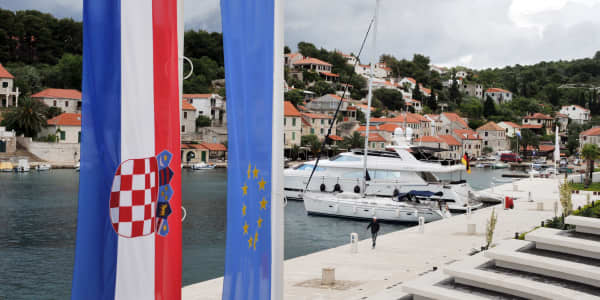Overreliance on Russian gas leaves Europe vulnerable if the conflict with Ukraine escalates, and it is eastern Europe that is most at risk, analysts have warned.
Both the European Union (EU) and United States have threatened to ratchet up sanctions against Russia unless it reins in pro-Russia rebels in eastern Ukraine, following Russia's annexation of Ukraine's Crimea region earlier this year.
So far, sanctions enforced include visa bans and asset freezes on companies and officials with links to Russian President Vladimir Putin. However, hawks in Washington in particular, have called for tougher penalties to hit Russia's vital energy industry, which accounts for around one quarter of its economy.
Such sanctions would hit Europe too though, given that Russia provides the EU with around one third of its natural gas imports, accounting for one quarter of the region's total natural gas consumption.
Henning Esskuchen, the head of central and eastern European equity research at Erste Bank, said eastern Europe's reliance on Russian energy was the standout hazard for the region as the crisis continues.
"We see dependence on gas supply as the key risk for the time being," he said in a report on third-quarter equity strategy.
Among EU member states, those geographically closest to Russia are typically more dependent.
"Bulgaria would be the hardest-hit member, as the country imports all its natural gas from Russia. Italy and Germany are less vulnerable, as both countries have diversified suppliers," said Prague-based economist Tomas Holinka in a report for Moody's Analytics.
Read MoreBulgaria bank fail flags region's 'Achilles heel'
Ex-Soviet satellite state Slovakia was also seen as vulnerable, as it is almost entirely reliant on imported gas, of which 83.5 percent comes from Russia. Plus, nearby Hungary imports over three-quarters of its gas, all of which come from Russia.
"In eastern Europe, only Romania has sufficient domestic production to withstand disruptions," said Holinka.
Since around 60 percent of Russia's natural gas exports travel through Ukraine, an escalation in the conflict could also hit European energy supplies.
"If the conflict spreads to Ukraine's heavily industrialized eastern regions, both Russia and Ukraine could slip into recession, causing a downturn in Europe. As Russia is a major energy supplier to Europe, the main risk would be power outages or the insecurity of gas pipelines through Ukraine," Holinka said.
Read MoreTrack natural gas prices with CNBC
In May, the European Bank for Reconstruction and Development (EBRD) downgraded its growth outlook for several countries in eastern Europe, citing negative spillovers from Ukraine among other factors.
Moldova and Belarus, both of which border Ukraine, saw their growth forecasts for 2014 cut, with the former now seen growing by 2.0 percent rather than 3.5 percent, and Belarus's economy expected to flatline.
"Since our forecast in January 2014, events in Ukraine/Russia have significantly increased geopolitical and economic uncertainty, with direct negative effects on the economies of Ukraine and Russia, and potentially wider implications for the region as a whole," said the EBRD in its report.
—By CNBC's Katy Barnato




